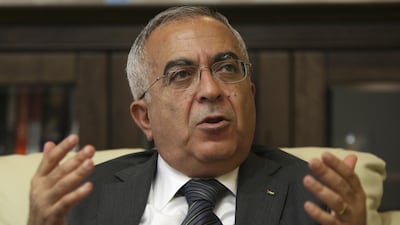Live updates: Follow the latest news on Israel-Gaza
Israel’s objective of eradicating Hamas through its war in Gaza is an “insane adventure” that cannot be achieved without killing “tens of thousands” of people there, a former Palestinian prime minister has warned.
Dr Salam Fayyad, who was Prime Minister of the Palestinian Authority from 2007 to 2013, questioned Israel’s strategy as the war enters its third month.
“What is this war about from Israel’s point of view?" Dr Fayyad asked, at a lecture hosted by the Balfour Project and the University of Hull.
"The theory that the strength of the bombardment will leave Hamas decapitated politically … I don't know if it's worth the investment."
Hamas was likely to “emerge” from the war, as its political ideology could not be defeated militarily.
The militant group had risen in popularity over decades, owing partly to “failures” of the peace process set out by the Oslo Accords in 1993, which sought the creation of a Palestinian state alongside Israel.
“The realisation set in among the Palestinians that the process was not going to deliver on its promise of freedom and statehood,” Dr Fayyad said.
The Palestine Liberation Organisation formed the PA as the result of the Accords.
But “missteps” in its governance, and Israel’s attempts to undermine it over “successive governments”, had left it weakened.
“The competing ideology that was Hamas and like-minded factions gained popularity,” said Dr Fayyad.
Successive wars in Gaza since the Israeli withdrawal in 2005 continued to increase Hamas’s popularity “significantly”, he said.
Dr Fayyad called for an “international custodianship” of the Palestinian territories after the war ends, followed by the Palestinian Authority.
He rejected the suggestion of a new “Hamas-free” governing body in Gaza, which would serve as an interlocutor for the territory with the international community.
“Schemes like this are based on the notion that the war is going to end only when Hamas is destroyed completely," Dr Fayyad said.
"That would mean the loss of lives of tens of thousands of Palestinians, even in the hundreds. This is an insane adventure."
It would also mean imposing an unelected government on the Palestinians in Gaza, which would be seen as an extension of the occupying force.
“Imposing an arrangement on the Palestinians to manage Gaza the day after is something I’ve been cautioning about since the very beginning,” Dr Fayyad said.
Yet given its political weaknesses, the Palestinian Authority would need to work to gain the “national consensus” to govern in Gaza after the war.
“If you are this feeble politically, you cannot assume the role of manager in the aftermath of such a devastating war,” Dr Fayyad said.
It was "impossible" to imagine a two-state solution “in the way it was originally achieved” during the 1995 Oslo Accords.
In these, statehood for Palestinians had been promised but never enshrined in the agreement.
The Israelis and the Palestinians had drawn different conclusions from this, Dr Fayyad said.
“It is not entirely clear to me that there was ever a point in time where there was congruence on the Israeli and Palestinian sides simultaneously on what that really meant,” he said.
He said the peace process should be revised to include the recognition of a sovereign Palestinian state from the outset, and where negotiations revolve around “arrangements and reassurances” rather than “narrative or principles”.
“The outcome has to be accepted from the outset," Dr Fayyad said. "It has to be the acceptance of the idea of a Palestinian state on the territories occupied in 1967.
“The principle that we Palestinians are a people who are entitled to national rights is something that is not open to discussion at all."


